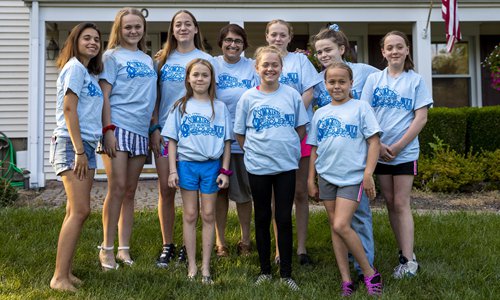HOME >> ARTS
New York ‘tiger mom’ creates advantage for nine daughters with Chinese immersion from infancy
Source:Xinhua Published: 2019/8/11 15:48:39

Lynn Berat (second row, center) poses for a picture with her children in front of their Chinese tutor's house in New Jersey on July 27. Photo: Xinhua
It is not uncommon for non-Chinese to learn Chinese nowadays, as the world's oldest in-use written language is becoming increasingly popular with the rapid rise of China.
But it is phenomenal that 58-year-old Lynn Berat, who holds two PhDs from Yale University, kind of "forced" her nine daughters to learn Chinese from infancy in a bid to have them well-prepared to be what she called "citizens of the world."
'Completely Chinese'
Berat fell in love with Chinese culture when she was giving lectures at Peking University in the early 1980s. She quickly realized that the Chinese language is "pictographic" and "very different" from Indo-European languages.
"It requires a greater effort than a language with an alphabet... Chinese seemed to be something that they [her children] should learn from infancy," Berat told the Xinhua News Agency in a recent interview.
"If they were going to learn it, then they needed to be completely bilingual. And so we're working on that," she said.
Berat has actually created a purely Chinese speaking environment for her nine girls, now aged from 11 to 19, ever since they were born: a Chinese-speaking nanny, a Chinese/English bilingual kindergarten and primary school as well as various extracurricular courses including Chinese dances, musical instruments and chorus.
"So their life has really been sort of all Chinese all the time," Berat said.
"Living in New York, it's been possible to immerse them deeply in Chinese language and culture."
The New York metropolitan area is home to the largest Chinese population outside Asia, with the number of Chinese-Americans estimated at about 800,000.
Interestingly, when Berat's youngest, twin sisters Logan and Lachlan, attended bilingual Pre-K at the age of 4, both of them easily passed the Chinese test but failed in the assessment of English.
It was such a "highly irregular thing" for children whose parent's home language was English. They would have been sent to a school for children with "severe learning disabilities" if the teacher and the principal had not known the stories of their older sisters.
"I have to say you have no idea how proud I am of that because to me, it meant that they were really working hard with their brains for Chinese. It kind of indicates the degree of our commitment to Chinese."
Apart from Chinese, all her girls have also learned Spanish and French, and can speak Albanian, which is Berat's mother tongue.
'Global century'
For the reason why she put on such a high priority for her children to learn Chinese, Berat sounded very forward-looking and very deep in thought.
"I feel very strongly that this century is a global century," she said.
"And to be a global citizen, you really have to know the world, and the more languages and cultures that you really know intimately, the better it is [for you]," she emphasized.
"My hope for them from the beginning has been that they will be citizens of the world, we're pushing them in that direction," she said.
The emerging economies including China, India have been changing the political, economic and cultural landscapes of the world in the past decades, said Berat, who has been to more than 120 countries so far.
Though India "isn't quite awakened yet," the speed of China's development is "very impressive," she said.
"No one had expected" that China would become the second-largest economy after the US when she first visited China's capital city of Beijing, Berat said.
"Then one didn't know what would happen with China at that stage, obviously we can see now how things developed," she said.
Naturally, Chinese is getting popular in the US and other parts of the world, she said.
"Chinese is the 'flavor of the month' in many ways," said Berat.
'Tiger mom'
"I thought I was a tiger mom," Berat said, chuckling when asked how she managed to have all of her girls keep on learning Chinese.
"It's not negotiable. They don't complain because they know there's no hope. But then they do it. That's it."
"It's not just textbook learning. You know, this has been their life. Their friends are Chinese. They've been in the Chinese cultural knowledge competitions... it's really been, for them, a lifelong commitment," said Berat, who herself is a strong lover of Chinese culture and history.
"You know, it really even for me is an astonishing way. But I feel all this effort has been worth it because they do get it. I think what's exceptional about them is because they've been deeply immersed in Chinese culture," she said.
"I think they are also beginning to understand that they have a very unique set of life skills," she explained.
"I think that's a great gift. I don't know how much they realize it's the gift that they have. But I think as they get older, increasingly they will appreciate it."
Her oldest daughter Lindsay is studying international politics in Chinese as a sophomore at the Shanghai campus of New York University. She aspires to find a job in the United Nations after graduation.
"I am very thankful to my mom. Learning Chinese has opened new windows for my life, and I got many more opportunities than my peers to experience the world," Lindsay told Xinhua in fluent Chinese.
Posted in: CULTURE & LEISURE,ARTS FOCUS